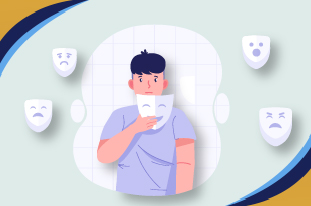Have you ever had a crush that felt too strong? You couldn’t stop thinking about them; they started affecting your life. That intense feeling might be called limerence. People with ADHD can experience limerence even more strongly. It can make it hard to focus, cause emotional ups and downs, and even lead to unhealthy dependence on the person they’re fascinated with.
This article will explain what limerence is, what is the link between limerence and ADHD, and how to stop limerence or how to get out of limerence.
What Is Limerence?
Limerence is a word used to describe a very intense feeling of love or attraction towards someone. It’s more than just a crush; it’s a fierce obsession where you can’t stop thinking about the person. People who experience limerence often daydream about the person they’re obsessed with, and they have a strong urge to be around them or think about them all the time.
Critical Characteristics Of Limerence Include:
- Intrusive Thoughts: Preoccupations with the person, intrusive thoughts that keep recurring and are difficult to repel.
- Emotional Dependence: People with bipolar disorder may experience mood swings based on whether they feel someone likes them back or not.
- Idealization: Looking for a supreme personality and not noticing the imperfections.
- Fantasy and Rumination: Engaging in activities like spending time or time in fantasies concerning interactions and imaginative conversations.
- Fear of Rejection: Not being liked back, rejected, or left alone.
Read More: Everything about Emotional Dysregulation in ADHD
How Does ADHD Intensify Limerence?
People with ADHD can have strong emotions and can get excited quickly. This makes them think how does limerence end? And does ADHD make you obsessive? They might struggle to control their feelings and focus on one thing at a time. Moreover, ADHD limerence can sometimes lead to several common mental health disorders such as Depression, OCD, Anxiety, Mood Disorder, MDD, Trauma, Bipolar Disorder, and lastly, Acute Stress. This can make limerence even more substantial and more complex to manage. Here are some ways ADHD can make limerence worse:
-
Obsession with the Loved One:
People with limerence ADHD tend to focus intensely on things that interest them. When they develop a strong crush, this intense focus can become obsessive, making it hard to think about anything else. This can disrupt their daily life and cause problems for their family and friends.
-
Emotional Ups and Downs:
People with ADHD often have trouble controlling their emotions. They can feel very happy or unfortunate quickly, especially regarding their feelings for someone they’re fascinated with. A simple word or gesture can make them think you are overjoyed or deeply disappointed.
-
Impulsive Behavior:
People with ADHD can act impulsively without thinking about the consequences. This can lead to behaviors like sending too many messages, making unwanted calls, or doing things that might annoy the other person. Unfortunately, these actions often don’t have the desired effect and can lead to regret.
-
Sensitivity to Rejection:
People with ADHD are often susceptible to rejection. When they’re infatuated with someone, even a tiny sign of disinterest can cause significant emotional pain and distress.
-
Difficulty Focusing on Other Things:
People with ADHD can find it hard to shift their focus from one thing to another. When they’re experiencing limerence, it can be challenging to concentrate on work, school, or other essential tasks.
Read More: Understanding ADHD Mood Swings: A Journey Through Emotional Waves
Common Symptoms That Point to Limerence While Suffering from ADHD
If you have ADHD and think you might be experiencing limerence, here are some common signs of ADHD and limerence:
- Constant Thoughts: You can’t stop thinking about this person and often daydream about them.
- Mood Swings: Your mood is heavily influenced by the other person’s actions and words.
- Intense Fantasies: You frequently imagine scenarios involving the other person.
- Increased Attention-Seeking Behavior: You might contact them often or find ways to be around them.
Managing Limerence With ADHD
While it can be challenging to control feelings of limerence, especially with ADHD, here are some strategies to help:

Set Boundaries:
- Limit your thoughts about the person to specific times.
- Create boundaries for yourself to avoid excessive rumination.
Practice Distraction:
- Engage in activities like hobbies, exercise, or spending time with friends.
- Distraction can help temporarily alleviate intense feelings.
Limit Social Media Exposure:
- Reduce your interaction with the person on social media to avoid triggering obsessive thoughts.
Mindfulness and Grounding Techniques:
- Practice mindfulness to stay present and reduce intrusive thoughts.
- Use grounding techniques like deep breathing or focusing on your senses to calm your mind.
Journaling:
- Write about your thoughts and feelings to gain better self-awareness.
- Journaling can help you process your emotions without acting on them.
Challenge Your Idealized View:
- Recognize and challenge idealized views of the other person.
- List their less-than-perfect qualities to gain a more balanced perspective.
Seek Support:
- Talk to a friend or therapist.
- Consider therapy, such as CBT, to manage intrusive thoughts and impulsive behaviors.
Consider Professional Help:
- Seek professional advice for managing ADHD symptoms.
- Explore options like medication or treatment to reduce limerence intensity potentially.
Read More: ADHD vs Depression: Finding The Link Between Them
Why Does Self-Compassion Matter?
It’s important to be kind to yourself. Remember that limerence is a complex experience, and feeling frustrated or ashamed is okay. You can work through these challenges more effectively by accepting your feelings and practicing self-compassion.
Final Thoughts!
Limerence can be a challenging experience, especially for people with ADHD. However, managing these intense feelings and building healthier relationships is possible with the right strategies and support. Remember, you are not alone, and there is hope for recovery. If you are also wondering what causes limerence to end? Then, you are on the right page. Orange Coast Psychiatry is the best mental health platform in the town. So, wait no longer, and get in touch today!
























